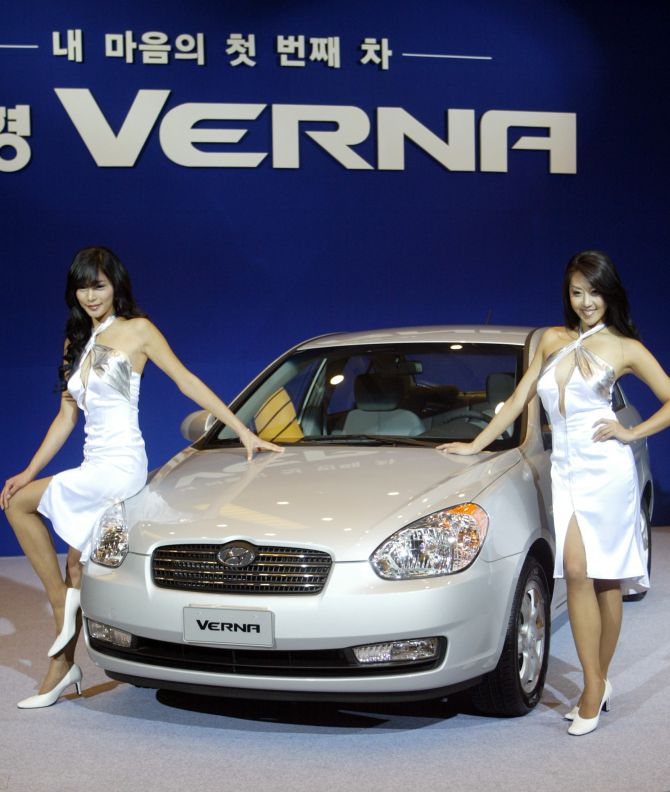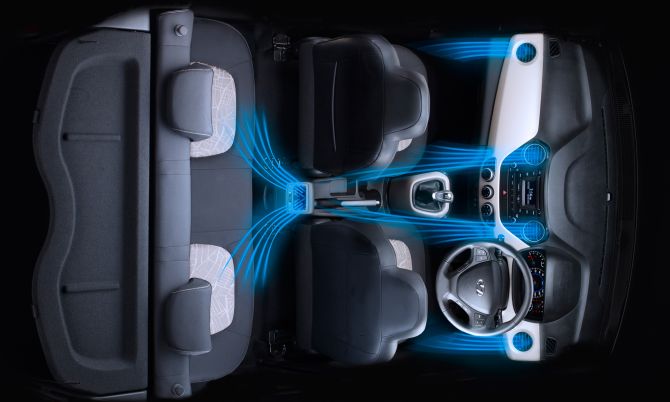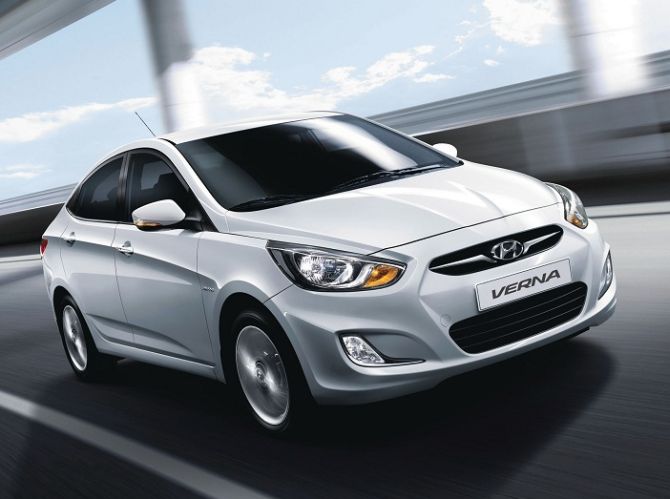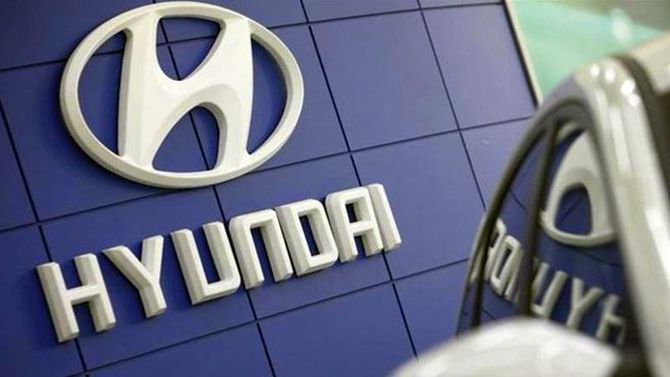Photographs: Reuters TE Narasimhan in Chennai
Korean giant Hyundai's subsidiary Hyundai Motor India has lined up a range of new models, besides stepping up its marketing push in rural areas, to make a splash in India, the world's sixth largest automobile market.
At the recent unveiling of the Grand, a cross between the i10 and the i20, Rakesh Srivastava, senior vice-president (marketing & sales), said the company will launch two to three new products every year, and it may also think of entering the SUV (sports utility vehicle) and MPV (multi-purpose vehicle) segment where it does not have a presence.
Besides, he said some of the older models will be refurbished in order to create a buzz around them.
Hyundai Motor India Managing Director & CEO B S Seo believes the new vehicles will find enough support among customers who are always looking for new products-even in a slowing market.
…
How Hyundai plans to take on Maruti Suzuki
Photographs: Courtesy, Hyundai
Automobile sales fell 7.4 per cent in July. But Seo is hopeful. "The Indian automobile market is going through a slowdown, but it is a temporary phase. India has got potential in the long run," he says.
The compact segment will be the key to the company's expansion efforts. Its latest offering in the category, the Grand, which was unveiled last week, is seen as an entry-level option in the high-end compact segment with Maruti's Swift and Ford's Figo as its immediate competitors.
The company believes, the car's diesel variant will be a big draw. "Diesel cars are preferred by the Indian customers and we believe it is here to stay. That's the reason we brought in this car," said Srivastava at the launch.
On an average, 156,000 cars are sold in India every month, of which 106,000 are compact cars.
…
How Hyundai plans to take on Maruti Suzuki
Photographs: Courtesy, Hyundai
Within this segment, high-end cars make up for 34 per cent of the sales, while entry-level cars account for the rest.
Because of the sheer volumes generated by high-end compact cars, automobile makers see the segment as a gateway of choice to gain a foothold in the Indian market.
"Although growth in the overall compact segment has fallen, the high-end segment has been growing," said Srivastava.
Hyundai has four brands in the segment-Eon, Santro, i10 and i20. Maruti, Ford and Nissan are the other players.
Overall, in the last five years, the company has brought in seven brands, including the Eon, Verna and i20.
…
How Hyundai plans to take on Maruti Suzuki
Photographs: Courtesy, Hyundai
A senior automobile analyst says new products have sold well in India owing to the excitement they create among buyers-part of the reason why Hyundai has been able to maintain its position in India.
It currently has a market share of 20.4 per cent, and is placed second in the market after Maruti Suzuki.
Srivastava says what has drawn buyers to its showrooms, among other things, is the innovation the company adds to its products.
For instance, he says the Grand will be the first car in its segment to have an AC vent for passengers in the rear seat. The Grand will also be the first car from the Hyundai stables to have a 1.1 U2 CRDI diesel engine.
The company has invested $300 million to set up an engine manufacturing facility in Sriperumbudur near Chennai for the car, says R Sethuraman, director (finance), Hyundai Motor India.
…
How Hyundai plans to take on Maruti Suzuki
Photographs: Courtesy, Hyundai
The new car, the company says, will be placed alongside the i10 in its showrooms. Hyundai sells 8,500-9,000 units of the i10 every month.
The company believes both the i10 and the Grand, though similar, will be able to hold its own in the market.
"Their is no question of cannibalisation. The two products will continue to co-exist. The i10 has got great acceptance, we have sold 700,000 i10s in the country so far," says Srivastava.
However, the company also faces plenty of challenges, says Yash Kothari, analyst with Angel Broking. Hyundai's compact cars are being introduced in a market that is already crowded with competitors, including Maruti. Kothari says Hyundai 's product range compares poorly with that of Maruti.
For instance, it has no car between the Eon and the i10 (between Rs 2.89 lakh and Rs 3.80 lakh), whereas Maruti has several options like the Alto 800, the A Star and Wagon R in that range.
…
How Hyundai plans to take on Maruti Suzuki
Photographs: Courtesy, Hyundai
Hyundai is looking at fixing the gap by building new cars on the Grand's platform. It is now for Hyundai's R&D team to create more options for buyers, says Srivastava. At the same time, the company is also eyeing newer segments such as compact SUVs.
"We are observing this segment closely. The volumes in this segment are interesting," says Srivastava.
When asked if a compact SUV is in the pipeline, he says: "It definitely interests us and we have the capability to launch one. Beyond this, I can't say anything."
Besides SUVs, the other thing on the company's list is a new mid-sized sedan. At present, the company does not have a brand in that space (below 4 metres).
Alongside strengthening its product portfolio, Hyundai is also stepping up its plans to reach rural and semi-urban consumers.
…
How Hyundai plans to take on Maruti Suzuki
Photographs: Reuters
At present, Hyundai has 270 outlets in the non-urban areas-it plans to take it to 350 by the end of the year. Rural demand has been on an uphill in recent months.
Srivastava says the rural market's contribution to its sales has consistently improved during the seven months in 2013.
The share of rural areas to total sales has risen from 15 per cent in 2011 to 18 per cent in the first eight months of 2013. By 2015, the target is to take it to 20 per cent.
In comparison, rural markets account for 28 per cent of Maruti's overall sales, according to Kothari.
The company says of all its products, the Eon has done better than others in rural India, partly because of the marketing initiatives undertaken by the company to highlight the car's advantages over other competing brands. "Today, over 8,000 units of the Eon are sold every month," says Srivastava.









article